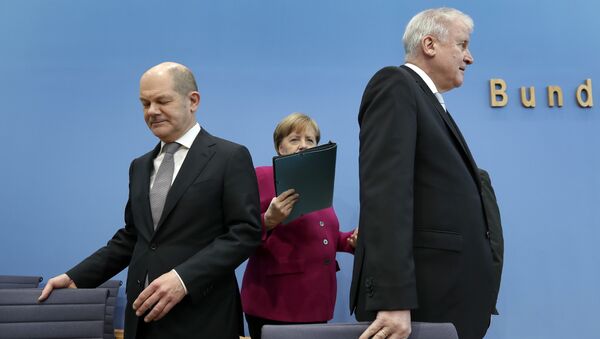German Interior Minister Horst Seehofer, the leader of Bavaria’s Christian Social Union, has become exasperated with his country's Chancellor, reportedly telling fellow legislators “I can’t work with the woman anymore.”
According to the German newspaper Welt, he repeated his remark twice during a behind-the-scenes meeting with CSU’s cabinet members and the head of its regional group in the Federal Parliament, Alexander Dobrindt. It took place before their conflict with Merkel’s Christian Democratic Union over proposing more border control measures escalated.
The newspaper cites the participants as saying the remark was made in anger, out of frustration or due to emotional exhaustion. It came the day after he spoke to the Chancellor about the harder border checks proposed in his "Masterplan for Migration." It suggests turning away refugees registered in other European countries at the German border, a move opposed by Merkel and the CDU.
However, in his recent interview with the German tabloid Bild, Seehofer stated that he doesn’t want a government crisis, and nobody targets Angela Merkel.
"No-one in the CSU is interested in overthrowing the Chancellor, dissolving the CDU / CSU faction, or breaking the coalition," he told the Sunday’s issue of the newspaper.
He also hasn’t given any details as to whether a compromise is possible, saying "We finally want a sustainable solution for refusing refugees inside our borders."
READ MORE: Germany: New Migration 'Master Plan' Sparks Discord in Merkel's Coalition
The schism between the two sister parties continues to grow, as the long time partners have failed to reach an agreement over the set-up, which overturns the principle of “open borders,” Angela Merkel's controversial signature migration policy. The growing disagreement has triggered speculation in the media that the coalition may be close to collapse because of the CSU. German newspaper Augsburger Allgemeine quoted an unnamed lawmaker as saying "We're not far off a break."
The fate of the package is to be decided on June 18, when the CSU leadership is to approve his project and put it into action despite Merkel’s opposition. If she decides to fire Seehofer, this may end the governing coalition reached by the CDU and CSU with the Social Democrats after months of talks in March.
It has been earlier speculated that she plans to bring up the discussion over Seehofer’s proposal to the European level, but the Government denies reports about a special European summit on the refugee issue.
Since 2015, Europe has been struggling to cope with the effects of hard-to-control immigration, with hundreds of thousands of migrants fleeing their conflict-torn countries in the Middle East and Africa.
Although Brussels introduced special quotas to distribute migrants in the bloc more evenly, some European governments have refused to follow the regulations, and are calling for closed borders. Germany took in 325,400 refugees in 2017, accounting for almost 60 percent of the 540,000 migrants resettled last year, according to the European statistics office. In 2015, when the “open borders” policy was announced, the country accepted over a million refugees.


